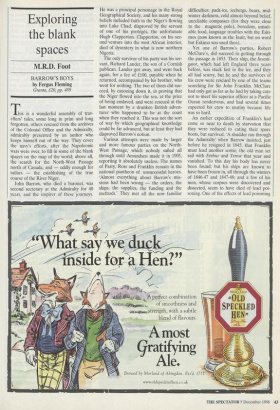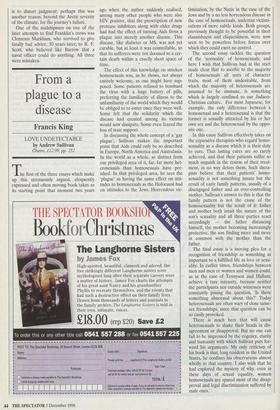Exploring the blank spaces
M.R.D. Foot BARROW'S BOYS by Fergus Fleming Granta, £20, pp. 489 his is a wonderful assembly of trav- ellers' tales, some long in print and long forgotten, others rescued from the archives of the Colonial Office and the Admiralty, admirably presented by an author who keeps himself out of the way. They cover the navy's efforts, after the Napoleonic wars were over, to fill in some of the blank spaces on the map of the world; above all, the search for the North-West Passage north of Canada, and — oddly enough for sailors — the establishing of the true course of the River Niger.
John Barrow, who died a baronet, was second secretary at the Admiralty for 40 years, and the inspirer of these journeys. He was a principal personage in the Royal Geographical Society, and his many strong beliefs included faith in the Niger's flowing into Lake Chad, disproved by the servant of one of his proteges, the unfortunate Hugh Clapperton. Clapperton, on his sec- ond venture into the west African interior, died of dysentery in what is now northern Nigeria.
The only survivor of his party was his ser- vant, Richard Lander, the son of a Cornish publican. Lander got away, and went back again, for a fee of £100, payable when he returned, accompanied by his brother, who went for nothing. The two of them did suc- ceed, by canoeing down it, in proving that the Niger flowed into the sea, at the price of being enslaved, and were rescued at the last moment by a drunken British adven- turer who happened to be at the coast when they reached it. This was not the sort of way by which geographical knowledge could be far advanced, but at least they had disproved Barrow's notion.
Various attempts were made by larger and more famous parties on the North- West Passage, which nobody sailed all through until Amundsen made it in 1905, reporting it absolutely useless. The names of Parry, Ross and Franklin remain in the national pantheon of unsuccessful heroes. `Almost everything about Barrow's mis- sions had been wrong — the orders, the ships, the supplies, the funding and the methods.' They met all the now familiar difficulties: pack-ice, icebergs, bears, mid- winter darkness, cold almost beyond belief, unreliable compasses (for they were close to the magnetic pole), boredom, unsuit- able food, language troubles with the Eski- mos (now known as the Inuit, but no word but Eskimo was used then).
Yet one of Barrow's parties, Robert McClure's, did succeed in getting through the passage in 1853. Their ship, the Investi- gator, which had left England three years before, was stuck fast in the ice, and they all had scurvy, but he and the survivors of his crew were rescued by one of the teams searching for Sir John Franklin. McClure had only got as far as he had by taking care not to meet his superior officer at a Pacific Ocean rendezvous, and had several times expected his crew to mutiny because life was so hard.
An earlier expedition of Franklin's had come so near to death by starvation that they were reduced to eating their spare boots, but survived. 'A shudder ran through the Admiralty' when Barrow insisted, just before he resigned in 1845, that Franklin must lead another sortie; the old man set sail with Erebus and Terror that year and vanished. To this day his body has never been found; but his ships are known to have been frozen in, all through the winters of 1846-47 and 1847-48; and a few of his men, whose corpses were discovered and dissected, seem to have died of lead poi- soning. One of the effects of lead poisoning is to distort judgment; perhaps this was another reason, beyond the Arctic severity of the climate, for the journey's failure.
One of the midshipmen on one of the later attempts to find Franklin's crews was Cements Markham, who survived to give fatally bad advice, 50 years later, to R. F. Scott, who believed like Barrow that a naval officer could do anything. All three were mistaken.



















































































 Previous page
Previous page